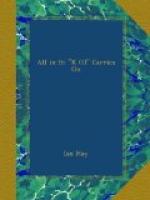But being, like Moses, slow of tongue, he provided himself with an Aaron. Quite inadvertently, be it said. Bidden to obtain a servant for his personal needs, he selected the only man in the Battalion whose name he knew—Private Bogle, the ci-devant painter of houses. That friendly creature obeyed the call with alacrity. If his house-painting was no better than his valeting, then his prospects of a “contrack” after the War were poor indeed; but as a Mess waiter he was a joy for ever. Despite the blood-curdling whispers of the Mess Corporal, his natural urbanity of disposition could not be stemmed. Of the comfort of others he was solicitous to the point of oppressiveness. A Mess waiter’s idea of efficiency as a rule is to stand woodenly at attention in an obscure corner of the room. When called upon, he starts forward with a jerk, and usually trips over something—probably his own feet. Not so Private Bogle.
“Wull you try another cup o’ tea, Major?” he would suggest at breakfast to Major Wagstaffe, leaning affectionately over the back of his chair.
“No, thank you, Bogle,” Major Wagstaffe would reply gravely.
“Weel, it’s cauld onyway,” Bogle would rejoin, anxious to endorse his superior’s decision.
Or—in the same spirit—
“Wull I luft the soup now, sir?”
“No!”
“Varra weel: I’ll jist let it bide the way it is.”
* * * * *
Lastly, Angus M’Lachlan proved himself a useful acquisition—especially in rest-billets—as an athlete. He arrived just in time to take part—no mean part, either—in a Rugby Football match played between the officers of two Brigades. Thanks very largely to his masterly leading of the forwards, our Brigade were preserved from defeat at the hands of their opponents, who on paper had appeared to be irresistible.
Rugby Football “oot here” is a rarity, though Association, being essentially the game of the rank-and-file, flourishes in every green field. But an Inverleith or Queen’s Club crowd would have recognised more than one old friend among the thirty who took the field that day. There were those participating whose last game had been one of the spring “Internationals” in 1914, and who had been engaged in a prolonged and strenuous version of an even greater International ever since August of that fateful year. Every public school in Scotland was represented—sometimes three or four times over—and there were numerous doughty contributions from establishments south of the Tweed.
The lookers-on were in different case. They were to a man devoted—nay, frenzied—adherents of the rival code. In less spacious days they had surged in their thousands every Saturday afternoon to Ibrox, or Tynecastle, or Parkhead, there to yell themselves into convulsions—now exhorting a friend to hit some one a kick on the nose, now recommending the foe to play the game, now hoarsely consigning the referee to perdition. To these, Rugby Football—the greatest of all manly games—was a mere name. Their attitude when the officers appeared upon the field was one of indulgent superiority—the sort of superiority that a brawny pitman exhibits when his Platoon Commander steps down into a trench to lend a hand with the digging.




